Haz clic aqui para leer en espanol
Historically, very few people of influence bothered with remote Patagonia. Two men of the cloth stand out in the memories of the people as having come amoung them and celebrated these incredible lands and people. Father de Agostini, in the early 1900s and, more recently, Father Ronchi.
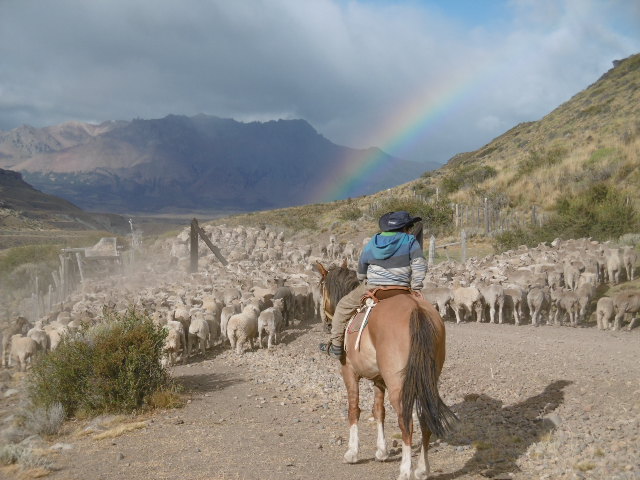 Traveling regularly to unreachable regions, there is speculation as to why they elected such a lifestyle. Life down here was rough and so were the people. “How do you think the original pobladores got down here? By plane or GPS? NO! Era por intento!” Andrea speaks passionately.
Traveling regularly to unreachable regions, there is speculation as to why they elected such a lifestyle. Life down here was rough and so were the people. “How do you think the original pobladores got down here? By plane or GPS? NO! Era por intento!” Andrea speaks passionately.
Before there were written records, it was the records of a traveling ladies caravan which would later be used to determine around when settlements or towns began. As one local woman put it, they did not have the means nor interest to bother with guilt and shame of the church.
Prostitution was an accepted part of life. It was often how the men came to have wives. “In the town records when someone died there was a column for the person’s profession. Beside the women these huevons would always write either ‘labores sexuales‘ which meant she came here as someone’s wife, or ‘trabajador sexuales‘ which meant she came here as a prostitute. Even if she settled down with one man and raised children for all the rest of her life, they would still mark it like this.”
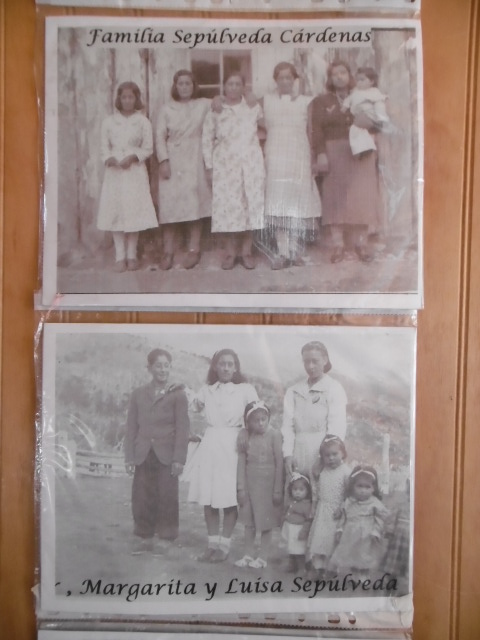
Even the people now do not lay judgment or blame, “because it is true! We call things like they are down here,” Sandra explains. “Really, the women down here were much more free. Most of the time people did not even get married. That meant if a woman did not like the man she was with, she could choose another. There were some Unions but not all that often.
My own gread-grandmother had 17 partners. One of them, se le mataron, the other 16 never dared return to Chile.”
Ronchi was an Italian priest who appeared in Patagonia in the 1960s. Traveling between the villages and remote farms on foot, he bucked many church traditions, instead adopting a more regional style of problem solving, calling on all community members to contribute. For a more complete account, check out this site.
“Era una cura rasca,” (he was a rascally priest) Jorge smiles, “I was very young but he was at my first communion. He would come and go a lot between the towns. He traveled like this until he died.” He ignored the pomp and circumstance and instead met the people at their own level.
The rotund cura traveled long distances and depended on the villagers for food and support. Well before there were roads or access to these southern reaches he traveled by foot carrying nothing but the bread which fit in the pockets of his robes.”He would walk long into the night sometimes.”
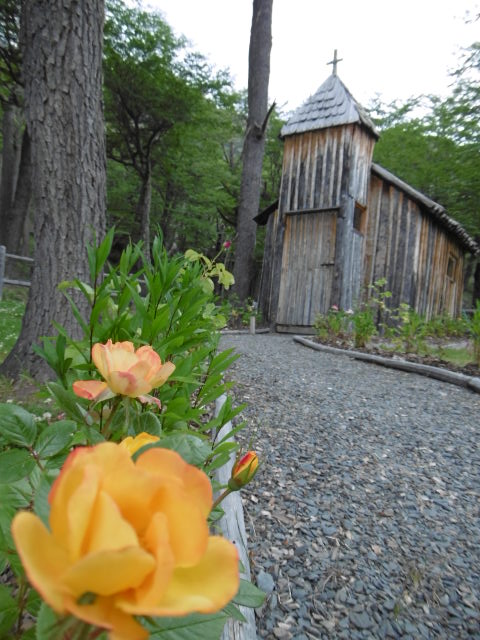 “He brought us radios,” Rodrigo explained, “he told the villagers that if they would build him a chapel, he would bring us a radio to broadcast. So they did, and the next season we had our first public radio broadcasting from right here,” he points across the street.
“He brought us radios,” Rodrigo explained, “he told the villagers that if they would build him a chapel, he would bring us a radio to broadcast. So they did, and the next season we had our first public radio broadcasting from right here,” he points across the street.
Never mind that the chapel itself is about 10 kilometers outside of the village and could fit maybe 12 people, standing room only. Everyone upheld their end of the bargain.
As we travel the Aysén region of Chile, small public radio stations broadcast, keeping those who live outside of range of WiFi or FM in the loop. Streets are named after him. People from Villa O’Higgins to Puerto Ibáñez know his name. They pat their bellies emulating his large paunch and grin. Some wink.
“Por eso, hay un solo padre Ronchi,” Sandra says, “many priests have passed through this region but to find people who are genuine and kind is truly unique. If all the priests were like Ronchi, everyone would want to be Catholic!” It takes a rascally priest to step away from judgment and condemnation fit in down here, and Ronchi is remembered for fitting in well.
La hora del cuento: sacerdotes y prostitutas.
Traducción por Henry Tovar
Históricamente, muy pocas personas con influencia molestaron a la remota Patagonia. Dos hombres destacan en la memoria de la gente como provenientes entre ellos y celebrando estas tierras y personas increibles. El padre De Agostini en el año 1900 y más recientemente, el padre Rochi.
 Viajando regularmente a las regiones inancanzables, se especula sobre por qué eligieron ese estilo de vida. La vida aquí erá aspera y así erán las personas. ´´¿Cómo creen que los pobladores originales llegaron hasta aquí? ¿en avión o con GPS? ¡No, Era por intento!´´ Andrea
Viajando regularmente a las regiones inancanzables, se especula sobre por qué eligieron ese estilo de vida. La vida aquí erá aspera y así erán las personas. ´´¿Cómo creen que los pobladores originales llegaron hasta aquí? ¿en avión o con GPS? ¡No, Era por intento!´´ Andrea
habla con pasión.
Antes de hubieran registros escritos, fueron los registros escritos de una caravana de damas viajeras que más adelante serian utilizados para determinar la zona cuando comenzaron los asentamientos o ciudades. Como una mujer local apuntó, no tenían los medios ni el interés en molestarse con la culpa ni la vergüenza de la iglesia. La prostitución era una parte aceptada de la vida. A menudo era cómolos hombres llegaban a tener esposas. ´´En los registros de la ciudad cuando alguien moría había una columna para la profesión de la persona. Al lado de las mujeres en estos huevons siempre escribian o bien ´´labores sexuales´´ que significaba que vino aquí como la esposa de alguién, o ´´trabajador sexual´´ que significaba que vino aquí como una prostituta. Inlcluso si ella se había establecido con un hombre y criado hijos por el resto
de su vida, seguirían marcandola así.

Incluso las personas que ahora no ponen en juicio o la culpa, ´´porque es verdad¡ llamamos a las cosas como si estuvieran aquí´´, explica Sandra. ´´En realidad, las mujeres abajo aquí eran muchos más libre. La mayoría de la veces la gente nisiquiera se casaban. Eso significaba que si una mujer no le gustaba el hombre con quién estaba con ella podría elegir otro. Hubo alguno sindicatos, pero no con tanta frecuencia.
´´Mi propia bisabuela tenia 17 socios. Uno de ellos, se lo mataron, los otros 16 nunca se atrevieron a regresar a Chile´´.
Ronchi era un sacerdote italiano que apareció en la Patagonia en la década de 1960. El viaje entre los pueblos y granjas remotas a pie, el se resistió mucho a las tradiciones de la iglesia, en lugar de adoptar un estilo más regional de resolución de problemas,
Pidiendo a todos los miembros de la comunidad para contribuir. Para una descripción más completa, echa un vistazo a este sitio.
´´Era una cura rasca´´. Jorge sonríe, ´´Yo era muy joven, pero él estuvo en mi primera comunión. Él iba y venía mucho entre los pueblos. Viajó así hasta que murió. ´´No hizo caso de la pompa y circustancia y en su lugar se reunió el pueblo en su propio nivel.
El cura rotundo viajó largas distancias y dependía de los aldeanos para la alimentación y apoyo. Mucho antes había carreteras o el acceso a estos extremos meridionales que viajó a pie llevando nada más que el pan que caben en los bolsillos de su túnica. ´´Se paseaban durante toda la nochea veces´´.
 ´´Nos trajo radios´´, explicó Rodrigo, dijo a los aldeanos que si le podian construir una capilla, que nos traeria un radio para transmitir. Así lo hicieron, y la próxima temporada tuvimos nuestra primera radiodifusión pública aquí´´, indica al otro lado de la calle. No importa que la capilla esta en sí a 10 km fuera del pueblo y podrían quizás 12 personas, sólo una habitación permanente. Todo el mundo cumplió con su parte del trato.
´´Nos trajo radios´´, explicó Rodrigo, dijo a los aldeanos que si le podian construir una capilla, que nos traeria un radio para transmitir. Así lo hicieron, y la próxima temporada tuvimos nuestra primera radiodifusión pública aquí´´, indica al otro lado de la calle. No importa que la capilla esta en sí a 10 km fuera del pueblo y podrían quizás 12 personas, sólo una habitación permanente. Todo el mundo cumplió con su parte del trato.
A medida que caminamos la región de Aysén, en Chile, las estaciones de radio públican pequeñas difusiones, dejando aquellos que viven fuera de la gama del Wifi o FM en el bucle.
Las calles se nombrarón después de él. La gente de Villa O´higgins a Puerto Ibáñez conocen su nombre. Ellos dan palmaditas en sus vientres emulando su gran panza y sonrisa.
Algunos guiños.
´´Por eso, hay un solitario padre Ronchi´´, dice Sandra. ´´muchos sacerdotes han pasado a través de esta región´´, sino para encontrar personas que son genuinas y amables, que es verdaderamente único. Si todos los sacerdotes fueran como Ronchi, todo el mundo fuera católico¡ ´´se necesita un cura pícaro para alejarse del juicio y la condenación para encajar aquí abajo, Rochi es conocido por encajar bien aquí.
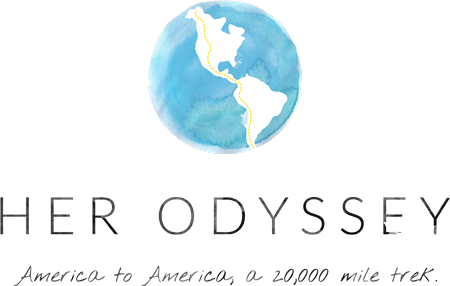


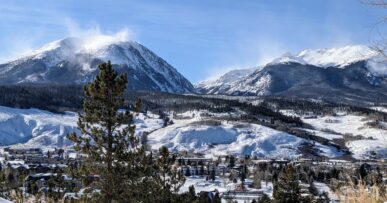


Comments (3)
Great story! Thanks. Warmly, Jaki and Henry
Thanks for the inspiring, honest and humble story of the faithful priest who was not judgmental. You write your stories with such vivid description!
Cliff and Martha Rawley
I’ve been following you two from the start, and I believe that this is your very best piece yet! Excellent work. This really gets to the soul of the people. Thank you for sharing your adventures with me.